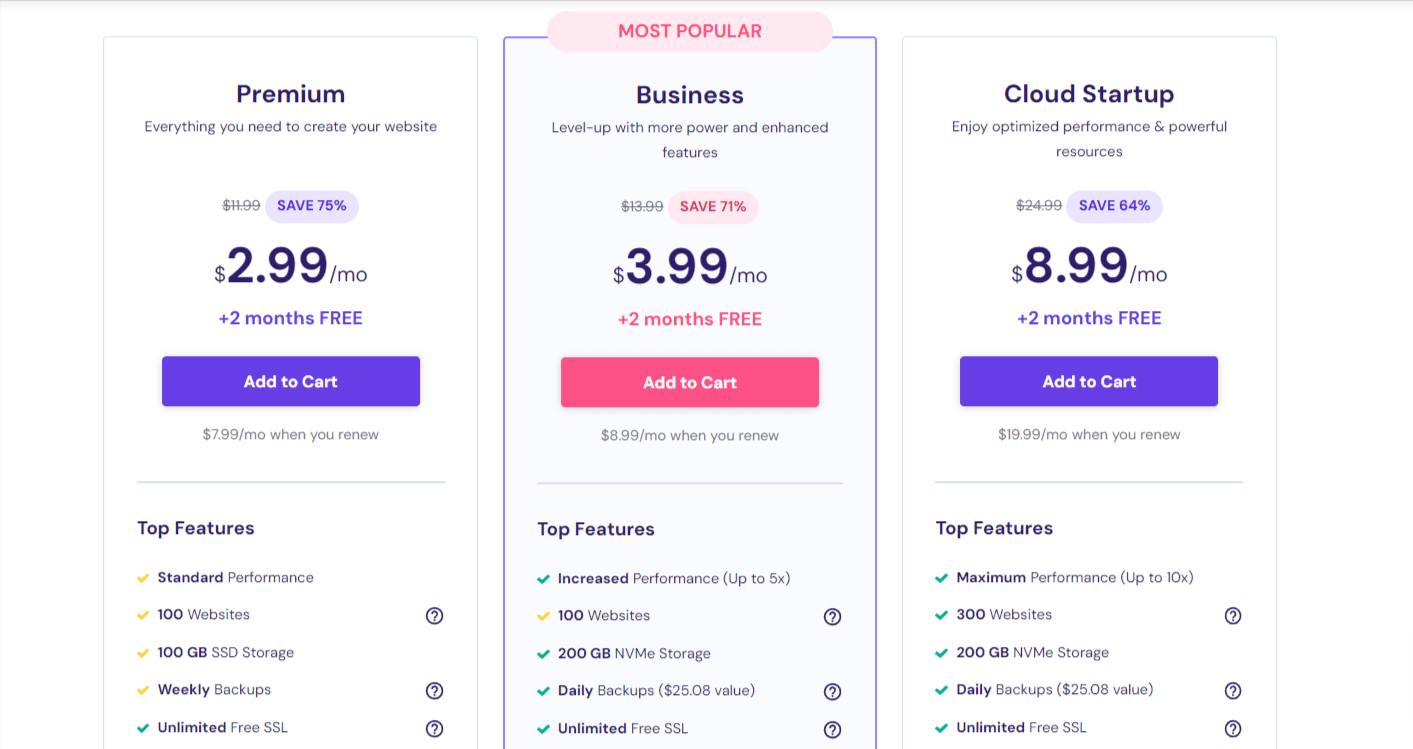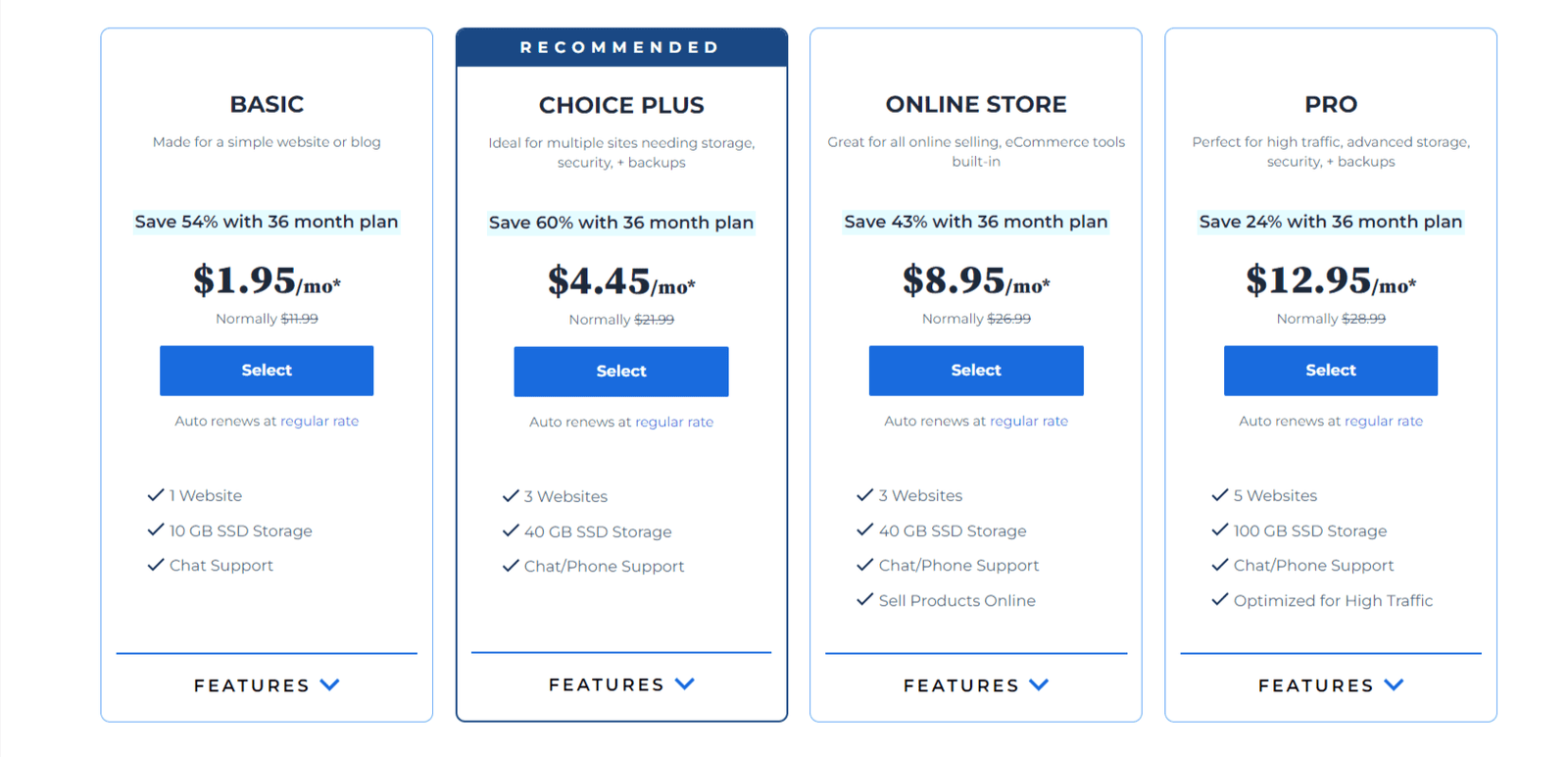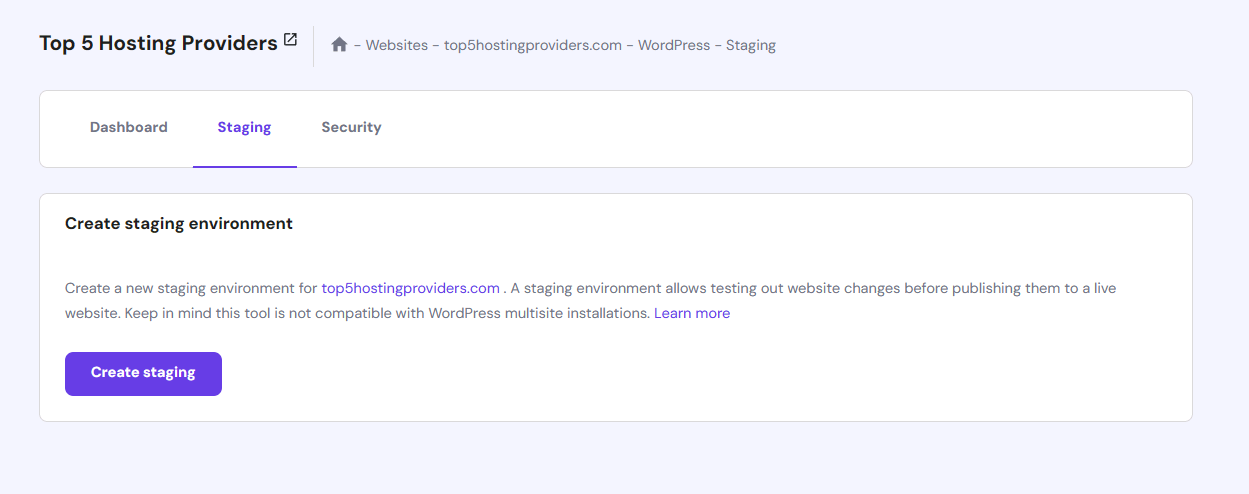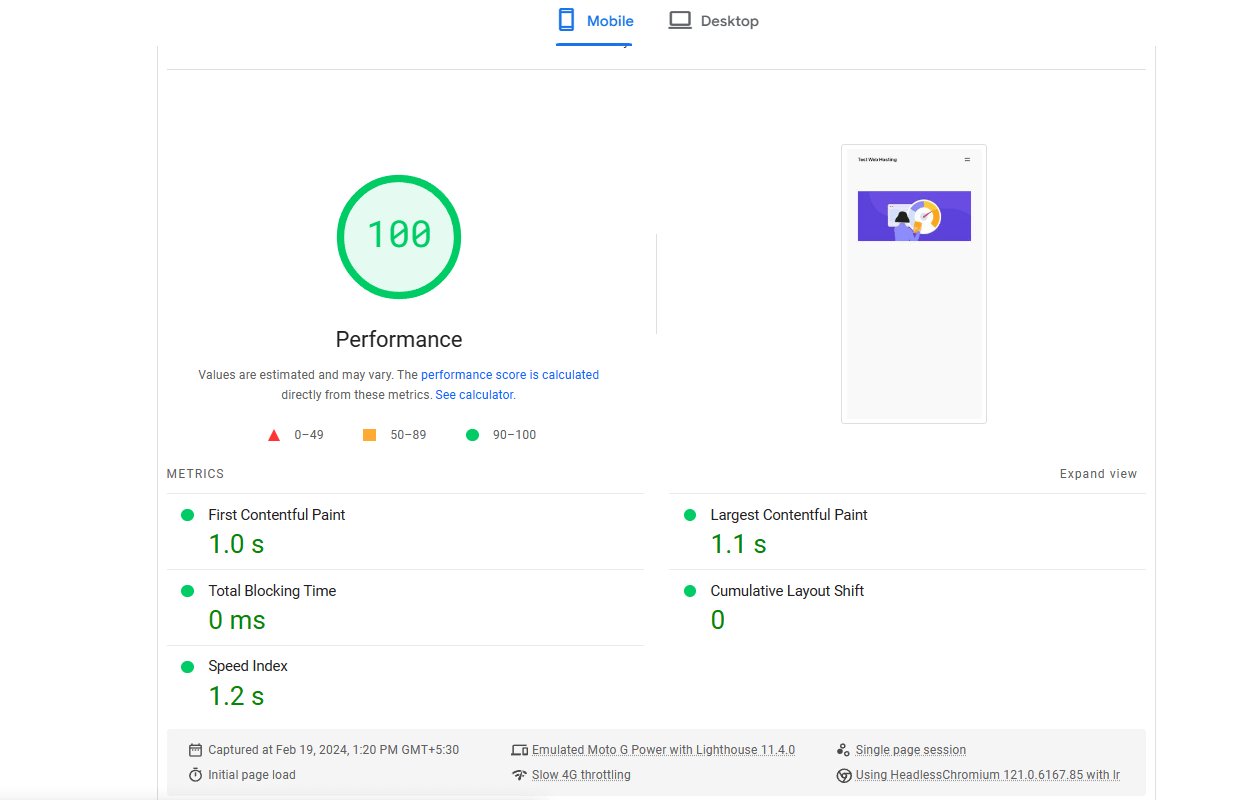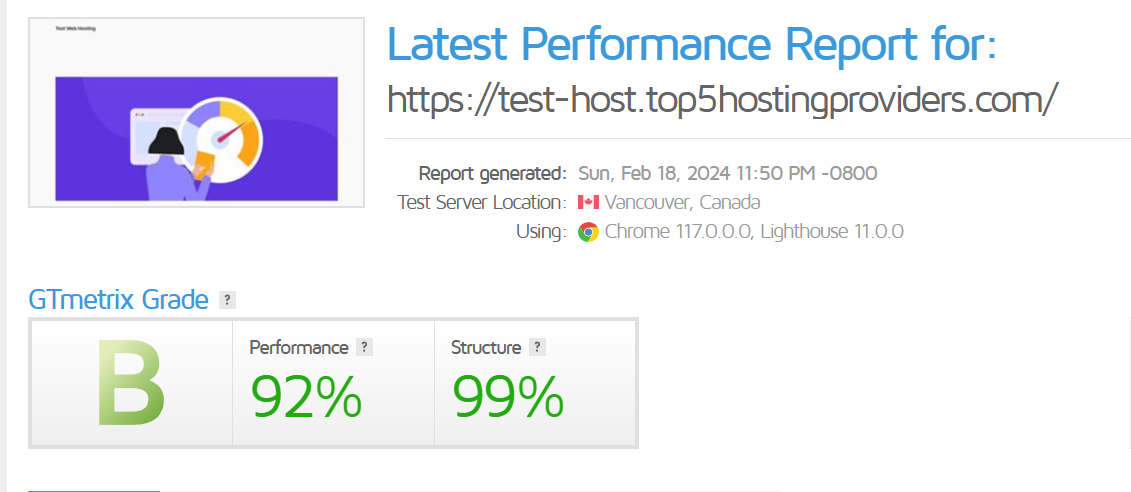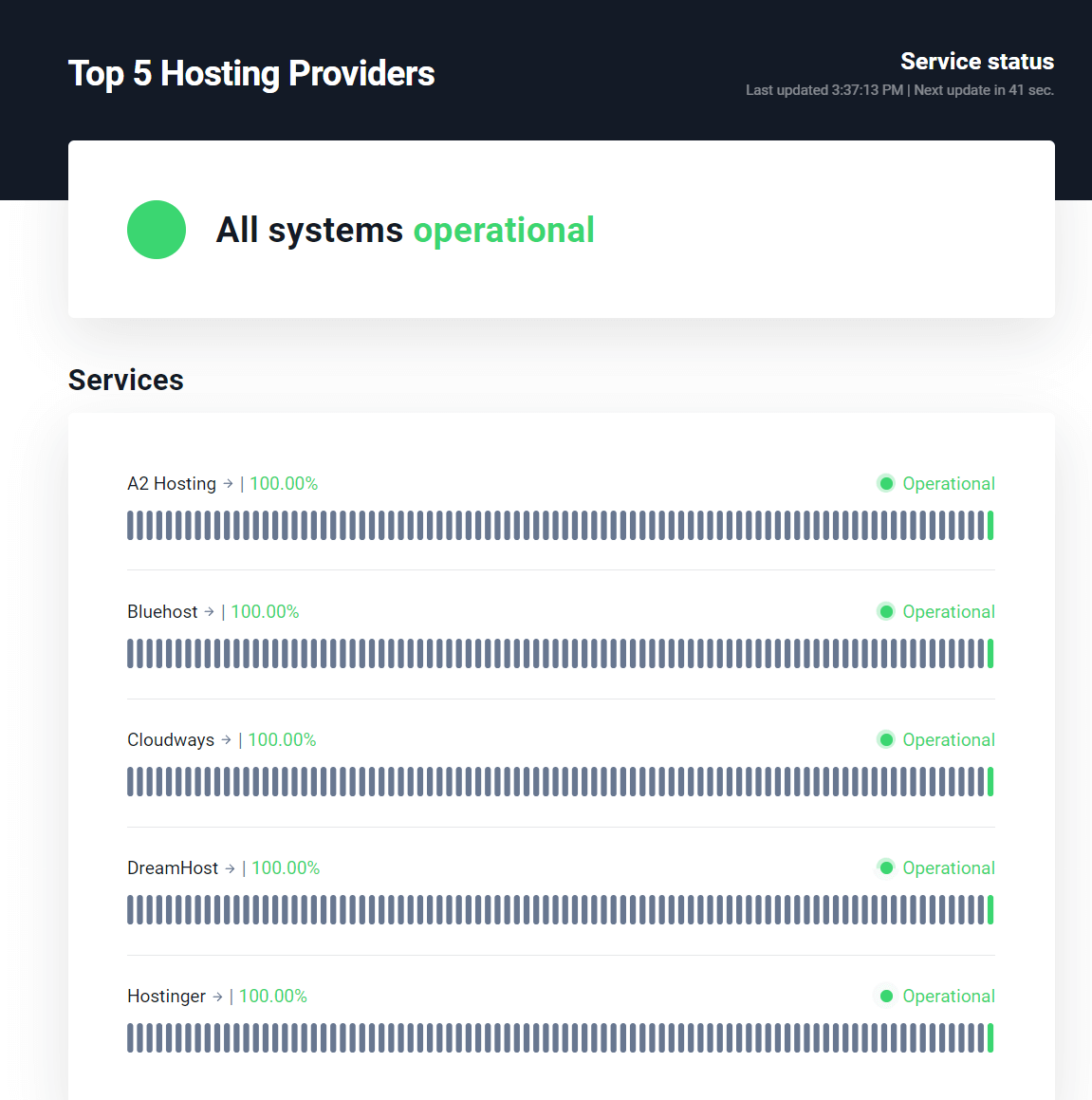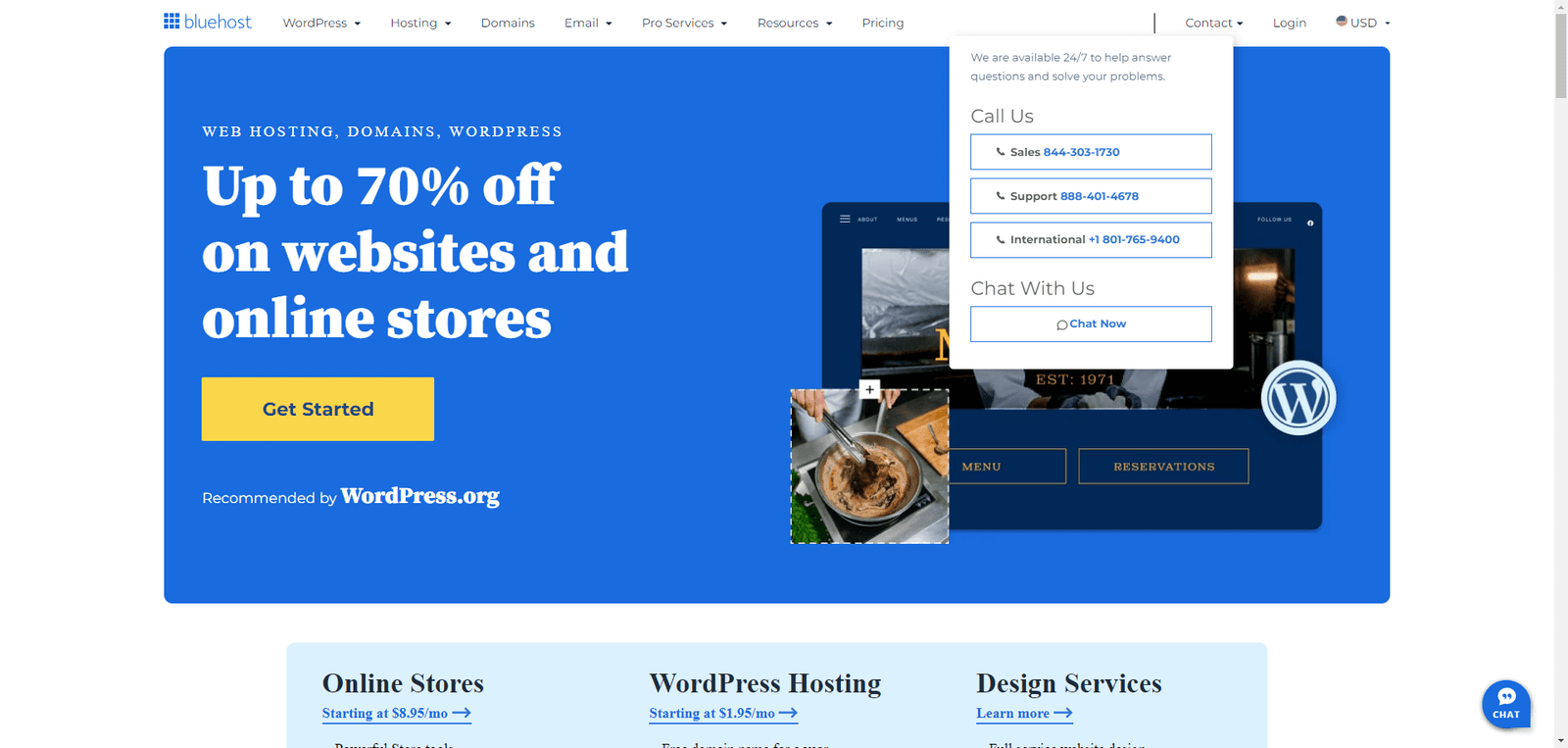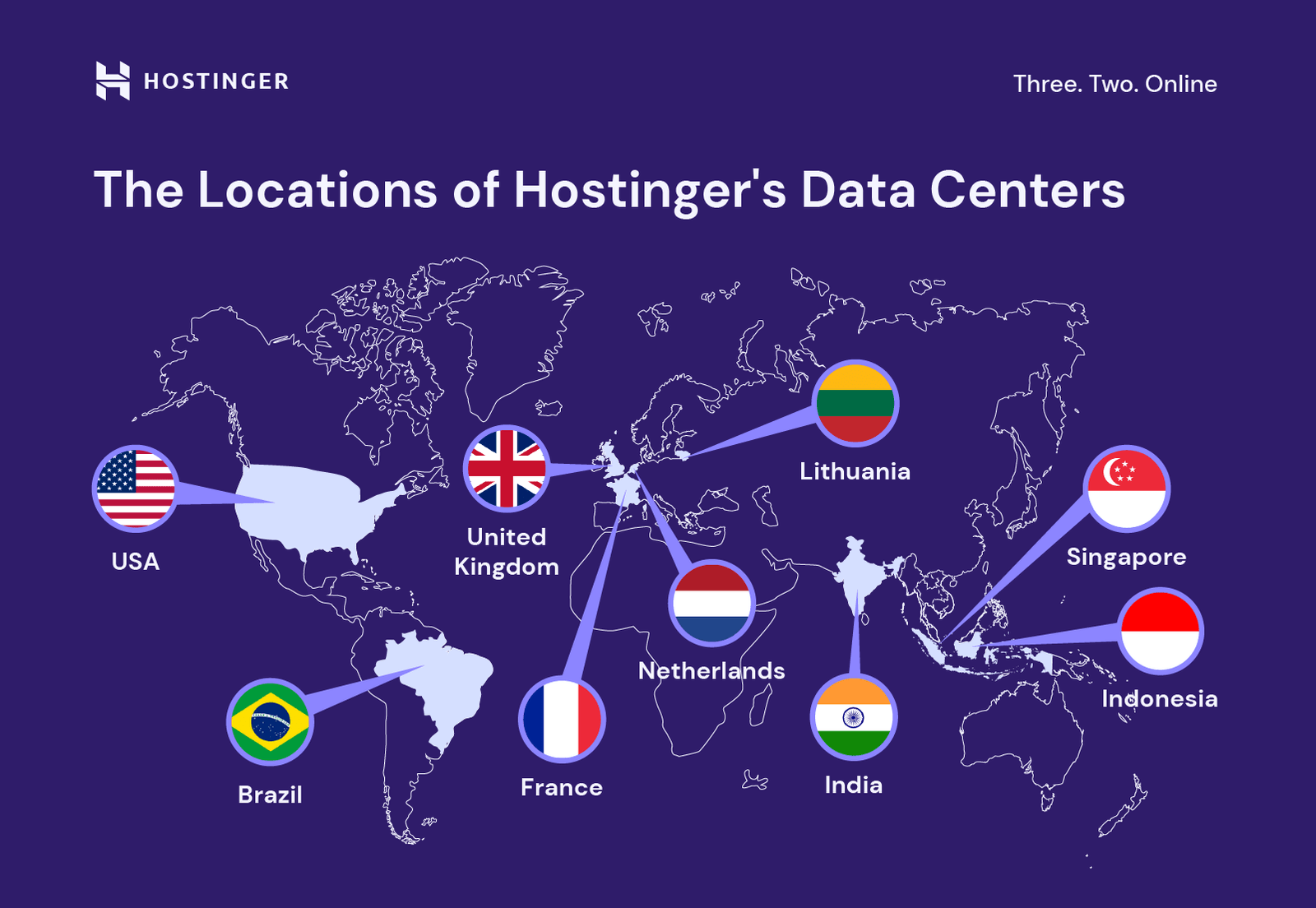Comparison of Hostinger and Bluehost: Overview
Hostinger and Bluehost are both widely recognized, but Bluehost holds greater popularity due to its long-established presence in the industry. Hostinger is renowned for its competitive pricing and excels in terms of performance. In contrast, Bluehost places emphasis on WordPress and business-oriented features but falls short in terms of performance optimization.
Hostinger
Bluehost
Hostinger Overview
Hostinger is a globally renowned web hosting provider, recognized for its cost-effective and user-friendly services. The company provides various hosting options at competitive prices, encompassing shared, VPS, cloud, and WordPress hosting.
All Hostinger plans come with complimentary SSL certificates, backups, built-in caching, and additional features. These services cater to a diverse range of users, spanning from beginners to more advanced clients seeking dependable and economical hosting solutions. Hostinger also offers domain registration services and a straightforward website builder.
Bluehost Overview
Bluehost, a prominent web hosting company established in 2003, has garnered widespread recognition for its diverse range of hosting services tailored to meet the needs of users across proficiency levels, from novices to experienced webmasters.
Its exceptional reputation extends to its WordPress hosting services, where Bluehost stands out as one of the select hosting providers officially endorsed by WordPress.org.
Distinguished by its user-friendly interface, Bluehost ensures that website management remains accessible, even for individuals lacking technical expertise. Hosting plans from the company typically encompass added benefits such as a complimentary domain name for the initial year, SSL certificates, and round-the-clock customer support.
Plans Pricing Comparison
Hostinger
Bluehost
Hostinger Pricing Plans
Designed to accommodate a spectrum of needs, from personal websites to robust business and e-commerce platforms, Hostinger’s plans offer competitive pricing and a suite of features. This makes Hostinger an affordable choice for a diverse range of users, with added benefits such as free SSL, domain privacy protection, and WordPress optimizations.
Shared Hosting Plans
Single Shared Hosting: Starting at $1.99 initially and renewing at $2.99, this plan is perfect for hosting a single website. It includes 30GB SSD storage, 100GB bandwidth, weekly backups, and a free SSL certificate.
Premium Shared Hosting: Beginning at $2.49 and renewing at $7.99, this plan accommodates up to 100 websites, offering 100GB SSD storage, unlimited bandwidth, weekly backups, free SSL, and a free domain for one year.
Business Shared Hosting: Priced from $3.69 initially, renewing at $8.99, this plan supports 100 websites, providing 200GB SSD storage, unlimited bandwidth, daily backups, free SSL, a free domain for one year, and access to a CDN.
VPS Hosting Plans
Hostinger’s VPS plans range from 20GB to 250GB SSD storage and bandwidth from 1TB to 12TB. Each plan includes a dedicated IP address, with prices starting from $3.99 per month for 20GB SSD storage and 1TB bandwidth, scaling up for advanced plans.
Cloud Hosting Plans
Cloud Startup: Priced at $8.99 per month, renewing at $19.99, this plan includes 200GB SSD storage, unlimited bandwidth, and is suitable for 300 websites.
Cloud Professional: Starting at $14.99, renewing at $32.99, this plan offers 250GB SSD storage, unlimited bandwidth, and can host 300 websites.
Cloud Enterprise: Initially priced at $29.99, renewing at $54.99, this plan comes with 300GB SSD storage, unlimited bandwidth, and supports 300 websites.
Bluehost Pricing Plans
All Bluehost plans come with a 30-day money-back guarantee. While their initial promotional prices are competitive, it’s crucial to consider the long-term costs, as renewal rates are typically higher.
Shared Hosting & Managed WordPress Hosting
Basic Plan: Starts at $2.95 per month for a 12-month term, renewing at $9.99 per month. Includes 1 website, 10GB SSD storage, unmetered bandwidth, free SSL, and a free domain for the first year.
Choice Plus Plan: Priced at $5.45 per month, renewing at $14.99 per month. Offers 3 websites, 40GB SSD storage, unmetered bandwidth, free SSL, and a free domain for the first year.
Online Store: $9.95 per month for a 12-month term, then $14.99 per month upon renewal. Includes 3 websites, 40GB SSD storage, unmetered bandwidth, free SSL, free domain, and daily backups.
Pro Plan: $13.95 per month initially, increasing to $28.99 per month. It includes 5 websites, 100GB SSD storage, unmetered bandwidth, high performance, and a dedicated IP.
VPS Hosting
Standard Plan: $29.99 per month initially, renewing at $29.99 per month. Features include 2 cores, 120GB SSD storage, 2GB RAM, and 1TB bandwidth.
Enhanced Plan: $39.99 per month initially, then $59.99 per month. Offers 2 cores, 165GB SSD storage, 4GB RAM, and 2TB bandwidth.
Ultimate Plan: $69.99 per month initially, renewing at $119.99 per month. Includes 4 cores, 240GB SSD storage, 8GB RAM, and unmetered bandwidth.
Dedicated Server Hosting
Standard Plan: $89.99 per month initially, then $119.99 per month. Includes 4 cores at 2.3GHz, 1TB storage, 8GB RAM, and unmetered bandwidth.
Enhanced Plan: $119.88 per month initially, renewing at $159.99 per month. Offers 8 cores at 2.5GHz, 2TB storage, 16GB RAM, and unmetered bandwidth.
Premium Plan: $139.99 per month initially, then $209.99 per month. Includes 8 cores at 3.3GHz, 2TB storage, 30 GB RAM, and unmetered bandwidth.

Hostinger secures the win for budget-conscious users due to significantly lower starting and renewal prices across various hosting types. While Bluehost offers a broader range of features, the higher renewal rates may not align with the budget-friendly preferences of all users.
Hosting Features Comparison
Hostinger
Bluehost
Hostinger Features
Hostinger offers a diverse range of hosting features catering to different needs. In their WordPress hosting, users can benefit from up to 200 GB of high-performance SSD storage, while VPS hosting provides a generous 400 GB of disk space. Unlimited bandwidth is available in WordPress and shared hosting, though it is capped at 8 TB for VPS hosting.
Ensuring data safety, Hostinger includes free daily backups and easy restoration options. The platform facilitates website creation with free WordPress installation, offers site migration services, a WordPress Acceleration feature, WP-CLI, SSH access, and a valuable site staging feature. For those without coding knowledge, Hostinger provides a free website builder, allowing easy design and customization.
One of the standout features that sets Hostinger apart is its robust Website Staging functionality. Website staging is a critical tool for web developers, designers, and businesses looking to make changes or updates to their websites without affecting the live, public-facing version.
Hostinger’s Website Staging feature allows users to create a duplicate or “staging” version of their website in a separate environment. This staging environment is private and inaccessible to the public, providing users with a safe space to test modifications, updates, or design changes before implementing them on the live site.
To enhance website security, all Hostinger plans come with a complimentary SSL certificate, ensuring secure and encrypted connections.
Bluehost Features
Bluehost’s shared hosting plan, starting at $2.95 per month, is competitive, offering 10GB of storage. For users requiring more resources and control, Bluehost’s VPS hosting plans, starting at $24.99 per month for a 12-month term, provide 30GB of SSD storage and 1TB bandwidth in their Standard plan.
Every Bluehost plan includes a free domain, CloudFlare CDN, and SSL certificate, adding significant value and security. The use of solid-state drives and free Cloudflare integration contributes to fast page load times by distributing large files across data centers.
Bluehost provides a user-friendly interface with cPanel-powered control panels, simplifying domain management, email setups, and website deployment.

Hostinger emerges as the winner with exceptional performance, fast server response times, and the inclusion of daily backups for enhanced security. Its competitive pricing, user-friendly tools like a free website builder, WordPress optimization, and the valuable site staging feature make Hostinger a more accessible and cost-effective choice for a diverse range of users.
Performance Comparison
Website Speed Comparison
To assess the loading speed of the hosting providers, our team has conducted tests by creating a website on subdomain “Test Web Hosting” and analyzing their performance on Google Insights. Hostinger outperformed Bluehost, demonstrating speeds more than twice as fast.
When evaluating speed, three key aspects were considered:
Largest Contentful Paint (LCP): This metric indicates marks the time at which the largest text or image is painted.
Total Blocking Time (TBT): Sum of all time periods between FCP and Time to Interactive, when task length exceeded 50ms, expressed in milliseconds.
Fully Contentful Paint: This FCP marks the time at which the first text or image is painted.
Hostinger excelled in all these aspects. The LCP (Largest Contentful Paint) was an impressive 1.1s, well within the acceptable range. The TBT (Total Blocking Time) was 0ms, indicating a fast-reacting server.
As for the Fully Contentful Paint, marks the 0.6s of time. Achieving a fully built website loading in less than a second is noteworthy, highlighting Hostinger’s speed efficiency.
On the contrary, Bluehost lagged in comparison. Its LCP was at 1.8 seconds, meeting the benchmark but showing room for improvement compared to Hostinger. The TBT for Bluehost was slower at 1 second, contributing to the variance in speed.
The reason behind Hostinger’s superior speed lies in its performance-focused approach. It implements various speed optimizations, including the use of the LiteSpeed web server with pre-configured caching and the latest PHP versions. Hostinger also allows users to choose server locations from 8 different data centers globally, optimizing speed for specific audiences.
In contrast, Bluehost relies on more traditional technology, resulting in basic caching and slower PHP version updates. Additionally, Bluehost has servers only in the US, potentially impacting speed for audiences in Europe or Asia.
Both providers demonstrate good speed results, but Hostinger stands out as significantly faster, thanks to its advanced server optimizations and a global server location selection feature.
On GTMetrix, Hostinger got an overall performance of 92%
Uptime Monitoring
We also monitored uptime for Bluehost and Hostinger over the 30-day period before writing this comparison. We found that Bluehost provided 100% uptime, whereas Hostinger had an uptime percentage of 99.99%.
You can check out our current uptime data on all the major hosting providers over at our status page.

Both providers demonstrate good speed results, but Hostinger stands out as significantly faster, thanks to its advanced server optimizations and a global server location selection feature.
Customer Support Comparison
Hostinger
Bluehost
Hostinger Customer Support
Hostinger’s customer service provides round-the-clock assistance through live chat and email, supporting users in multiple languages.
Despite varying response times, their support team consistently receives praise for their knowledge and helpfulness. This dependable and accessible support system is particularly advantageous for users with limited technical expertise, making Hostinger a reliable choice for a broad spectrum of hosting needs.
Bluehost Customer Support
Bluehost offers a comprehensive support system that includes live chat, phone support, forums, email assistance, video tutorials, and an extensive knowledge base.
The live chat feature is especially favored for its convenience and typically rapid response times, enabling real-time issue resolution.
Bluehost’s live chat is showcased in the screenshot below, and the support team provides a toll-free phone number, ensuring immediate assistance 24/7.
While Bluehost excels in phone and live chat support, it does not offer a feature for submitting support tickets.

In the overall assessment, neither provider is flawless in terms of support, as each has unique strengths and limitations. However, for this comparison, the victory goes to Bluehost due to its superior phone support and live chat services. Nevertheless, both Hostinger and Bluehost maintain a dependable customer support service, catering to the diverse needs of their users.
Hosting Sever Location Comparison
Hostinger Server Locations
Hostinger maintains server locations in several countries, including the USA, UK, Brazil, Netherlands, Singapore, Indonesia, and Lithuania.
This extensive geographical coverage proves advantageous for users aiming to target specific regional markets. It enables users to select a server closest to their primary audience, optimizing website performance and responsiveness.
Bluehost Server Locations
Bluehost predominantly operates its servers from the United States, showcasing a focus on serving North American audiences.
While this concentration of servers in the U.S. ensures robust performance for websites targeting primarily North American visitors, it may result in slightly higher latency for websites with a more international audience. This is in contrast to providers like Hostinger, which boast a more widespread global presence with servers in various locations.

Hostinger emerges as the undisputed champion. With its globally distributed servers, Hostinger excels in providing decreased latency and quicker loading times, catering to a diverse international audience.
Hostinger vs Bluehost FAQs
Hostinger provides free SSL certificates, daily backups, and a robust security protocol. Bluehost, on the other hand, offers free SSL, domain privacy, and SiteLock security options. The specifics of their security features may vary, so it’s essential to assess individual needs.
Hostinger’s shared hosting plans specify the number of websites allowed. Bluehost, too, has restrictions based on the chosen plan. It’s crucial to review the hosting packages to determine the optimal fit for the number of websites you plan to host.
Both Hostinger and Bluehost offer scalable hosting plans, allowing users to upgrade as their website requirements expand. They typically provide straightforward processes for upgrading to more advanced plans with increased resources.
Hostinger provides a 30-day money-back guarantee, while Bluehost offers a similar refund policy. It’s important to understand the terms and conditions of the money-back guarantee, including any potential fees or conditions that may apply.
Hostinger offers e-commerce features like a free SSL certificate and compatibility with various CMS platforms. Bluehost, known for its WooCommerce integration, provides tools for building and managing online stores. Consider your specific e-commerce needs when choosing between the two.

